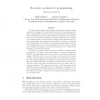Free Online Productivity Tools
i2Speak
i2Symbol
i2OCR
iTex2Img
iWeb2Print
iWeb2Shot
i2Type
iPdf2Split
iPdf2Merge
i2Bopomofo
i2Arabic
i2Style
i2Image
i2PDF
iLatex2Rtf
Sci2ools
109
click to vote
ICFP
2006
ACM
2006
ACM
Recursive modules for programming
d abstract) Keiko Nakata1 Jacques Garrigue2 1 Kyoto University Research Institute for Mathematical Sciences 2 Graduate School of Mathematics, Nagoya University The ML module system enables flexible development of large software systems by its support of nested structures, functors and signatures. In spite of this flexibility, however, recursion between modules is prohibited, since dependencies between modules must accord with the order of definitions. As a result of this constraint, programmers may have to consolidate conceptually separate components into a single module, intruding on modular programming. Recently much work has been devoted to extending the module system with recursion, and developing a type system for recursive modules has been one of the main subjects of study. Since recursion is an essential mechanism, one faces several issues to be considered for designing a practical type system. Our goal is to make recursive modules an ordinary construct for ML programmers. We w...
Checking Recursive Modules | ICFP 2006 | Practical Type System | Programming Languages | Recursive Modules |
Related Content
| Added | 13 Dec 2009 |
| Updated | 13 Dec 2009 |
| Type | Conference |
| Year | 2006 |
| Where | ICFP |
| Authors | Keiko Nakata, Jacques Garrigue |
Comments (0)

